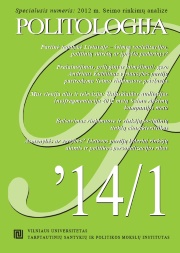ASMENYBĖS AR VERTYBĖS? LIETUVOS PARTIJŲ LYDERIAI RINKĖJŲ AKIMIS IR POLITIKOS PERSONALIZACIJOS RIBOS
PERSONALITIES OR VALUES? LEADERS OF LITHUANIAN POLITICAL PARTIES IN THE EYES OF VOTERS AND LIMITS OF PERSONALISATION OF POLITICS
Author(s): Jūratė KavaliauskaitėSubject(s): Politics / Political Sciences
Published by: Vilniaus universiteto leidykla & VU Tarptautinių santykių ir politikos mokslų institutas
Summary/Abstract: Lithuanian public debates share a strong conviction that the relationship between a Lithuanian voter and his/ her political representatives rests on personalisation, often nurtured by voter’s subjective and irrational feelings of love or hate in regard to particular political leaders. Is such kind of pessimism well-grounded and there are no “antidotes” to this worrisome trend of the present political life? The article addresses the problem of personalisation of political life in the post-soviet environment and attempts to challenge the aforementioned pessimism. The presented study aims to explore the relationship between perceptions of well-known Lithuanian political leaders’ personality portraits among the Lithuanian population and voter’s normative orientations on the individual level, holding voter’s normative orientations an important factor, limiting the proliferation of personalisation of politics. Perceptions of personality traits of political leaders on the individual level of analysis are expected to pass through voter’s normative „lenses“ to produce different mental images of politicians in accordance to individual differences in politically significant value orientations. The study explores how perceptions of political leaders’ personalities in Lithuanian vary according to (a) respondent’s ideological self-identification on Left-Right scale, (a) respondent’s level of adherence to Soviet (anti-Soviet) values, (b) adherence to national conservatism (c), and post-materialist values (d). In order to understand the impact of individual’s ideological dispositions and value orientations on perception of personalities of politicians, the article follows a comprehensive theoretical approach to personality. Five-factor personality model (“Big Five”) stands out in terms of comprehensiveness and feasibility to the aims of the presented study. The Big Five offers not only a taxonomy of personality traits but also the conceptualisation of five personality dimensions. With a strong empirical orientation, it provides the conceptualisation of methodological tools for empirical studies of personality and the basis for a list of semantic differentials to measure the perception of political leader’s personality traits. The empirical analysis rests on the data of an internet panel survey, conducted in Lithuania in two waves – right before (August – September, 2012) and after (November, 2012) the Lithuanian General Elections 2012. The internet survey, administrated by research company Berent (N=1019), is representative in terms of the total population of internet users in Lithuania. Results of the study reveal a potential of individual’s normative orientations to predict his/ her perception of political leaders’ personalities on a number of personality traits and personality dimensions.
Journal: Politologija
- Issue Year: 2014
- Issue No: 1 (73)
- Page Range: 129-178
- Page Count: 50
- Language: Lithuanian

